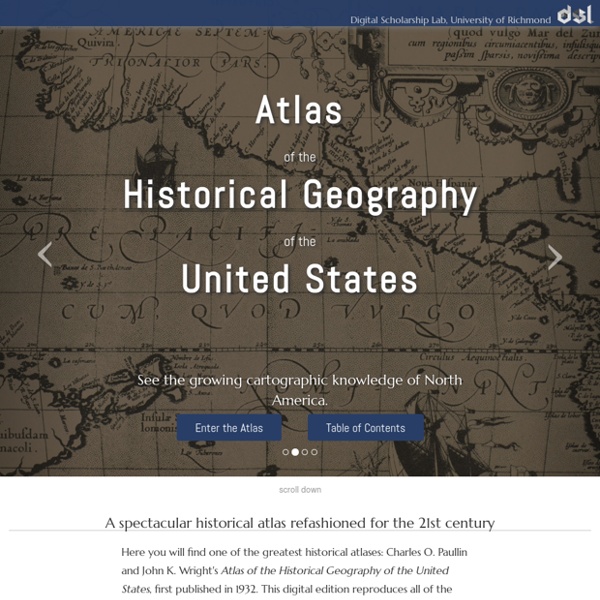Feeding America
Feeding America: The Historic American Cookbook Project The Project The Feeding America project has created an online collection of some of the most important and influential American cookbooks from the late 18th to early 20th century. The digital archive includes page images of 76 cookbooks from the MSU Library's collection as well as searchable full-text transcriptions. This site also features a glossary of cookery terms and multidimensional images of antique cooking implements from the collections of the MSU Museum. The Feeding America online collection hopes to highlight an important part of America's cultural heritage for teachers, students, researchers investigating American social history, professional chefs, and lifelong learners of all ages. Feeding America was made possible with funds from a 2001 IMLS National Leadership Grant. To learn more Information about the project please select one of the following: Top of the Page
U.S. Board on Geographic Names
David Rumsey Historical Map Collection
Land of Opportunity
U.S. Army Center Of Military History
FamilySearch: US Migration Internal
Value of Migration Research Mountains, forests, waterways, and the gaps between them channelled migration into predictable settlement patterns. Events like gold or land rushes, and Indian treaties also affected settlement. Understanding the transportation systems available to ancestors can help genealogists better guess their place of origin. Connect the place where an ancestor settled to the nearby canals,waterways, trails, roads, and railroads to look for connections to places they may have lived previously. Migration research may help you discover: a place of origin, previous hometown, or place where an ancestor settled biographical details such as what they experienced, or with whom they traveled on their journey clues for finding other records Types of U.S. Actual lists of travelers are unusual. Censuses, directories, land and property records, plat maps, tax records, and voting registers can sometimes be used to learn where new arrivals settled. Migration Records for Selected States
Maps Library of Congress
↓ Refine your search [Shandong, Zhili, Shengjing hai jiang tu] Scale ca. 1:125,000. Title supplied. Oriented with north to the left. Relief shown pictorially. Pictorial map. De Eylanden en Vastelanden van Westindien / Relief shown pictorially.
Anti-Eviction Mapping Project
Making of America
aking of America (MoA) is a digital library of primary sources in American social history from the antebellum period through reconstruction. The collection is particularly strong in the subject areas of education, psychology, American history, sociology, religion, and science and technology. The collection currently contains approximately 10,000 books and 50,000 journal articles with 19th century imprints. For more details about the project, see About MoA. Making of America is made possible by a grant from the Andrew W. New Additions: We have recently added a new feature, subject browsing. 99 more volumes focusing on New York City were added to MoA in June 2007.
The Rocker Box: Ghost Towns
Here is a repository for ghost towns, almost ghost towns, stories of lost treasures, lost mines, and buried treasure, and other treasure information. Pick your state to find treasures and ghost towns in your area. Unlinked states will be added soon, so... Check back often! Do you know of other ghost towns or treasure stories? Email us the details.You and your club will get full credit! Notice for anyone using a "pop-up blocker" Research does not end with the knowledge that an event occurred that resulted in a "buried treasure," and that the treasure exists. This is where detailed research comes into play. When available, a published source (book) is available as a link below the story that you can purchase for additional information. Outstanding resources exist on the internet. Over the years, names of creeks, gulches, mountains, even whole mountain ranges can change. Old maps can show the original names of these places and aid in the hunt.
James Farmer Project
National Jukebox LOC.gov
WARNING: Historical recordings may contain offensive language. Read the disclaimer Now Playing... Elk's reunion march Le parlate d'amor El teléfono a larga distancia At the jazz band ball Everybody's jazzin' it Pack up your troubles in your old kit bag and smile, smile, smile! View This Playlist 1919 Victrola Book of the Opera Stories of the operas with illustrations and descriptions of Victor opera records. More about Victrola Book of the Opera News The National Jukebox debuts featuring more than 10,000 78rpm disc sides issued by the Victor Talking Machine Company between 1900 and 1925. Imagine your computer as a new Gramophone purchased for family and friends to enjoy in your home parlor. Victor Advertisements The success of the Victor Talking Machine Company is often attributed to its aggressive and comprehensive print advertising campaigns. Coming Soon to the National Jukebox New recordings are added to the Jukebox periodically.
The American Genealogical Index v.6
You are browsing the text-only version of this page. The text-only version contains the complete content and navigation of this page, without purely cosmetic visual styling. NOTE: Older browsers, or those with poor support for web standards, may not be able to display the graphical version of our website. A list of standards-friendly browsers capable of displaying the graphic version is available. Please enter your Login ID (uniqname or Friend ID) and password to continue. Need a Login ID? Create a Login ID now. Important Security Tips U-M will never send you an email asking for your password. This page displays best when JavaScript is enabled in your web browser. Please Note: MToken is not available on mobile devices. Login Help To access many U-M computing services, you will need a Login ID (uniqname or Friend ID) and the associated password. Faculty, staff, students, retirees and sponsored affiliates should already have a uniqname. Need a Login ID? MToken Help What is an MToken?
Jeffrey W. McClurken | A Starting Place for My Digital Work



